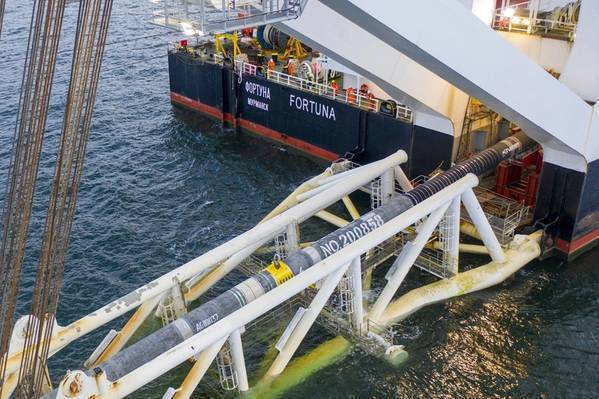
German Chancellor Olaf Scholz said last week that Germany may consider halting the Nord Stream 2 pipeline if Russia attacks Ukraine, reflecting growing political pressure on the Gazprom-led project.
Russia has massed troops on the Ukrainian border but denies it is planning an attack, while the United States and Europe have promised to impose sanctions on Moscow should it invade, with Nord Stream 2 one of the possible targets.
Europe's most divisive energy project, Nord Stream 2 is designed to double the amount of gas flowing from Russia straight to Germany, bypassing traditional transit nation Ukraine.
It has faced resistance within the European Union and from the United States, as well as Ukraine, on the grounds it increases Europe's energy dependence on Russia and denies Ukraine transit fees.
While technically completed since last year, Nord Stream 2 awaits official certification from Germany where the deep sea pipeline makes landfall, a lengthy process that adds another layer of complexity.
WHAT'S THE PROBLEM?
Germany's Federal Network Agency - which regulates the country's electricity, gas, telecommunications, post and railway sectors - in November suspended a process to certify the pipeline that runs under the Baltic Sea.
Technical requirements have been met. The sticking point is whether Gazprom will comply with European unbundling rules that require pipeline owners to be different from suppliers of gas flowing in them to ensure fair competition.
Once Nord Stream 2 forms a company under German law to get an operating licence, the certification process will resume. But the regulator said last month that no decisions would be made in the first half of 2022.
The Nord Stream 2 operator says the rules aim to torpedo the pipeline and in October scored a partial victory when an adviser to the European Union's top court recommended that Gazprom could challenge UPDATE 2-Gazprom's Nord Stream 2 can challenge EU rules, EU court adviser says - Reuters News the EU rules.
The project's identically-sized sister pipeline, Nord Stream 1, has been exempt from unbundling rules since opening in 2011 because it was treated as an interconnector rather than as direct supplier.
WHAT HAPPENS AFTER THE RECOMMENDATION?
Once a three-member independent ruling committee at the network agency has made its recommendation, the European Commission has two months to respond, a period that can be extended by a further two months.
If both bodies are in agreement that the pipeline fulfils all regulatory requirements, then certification can be issued relatively quickly.
If they disagree, the process could be further delayed as certification can be only given when both have resolved any differences, meaning the pipeline approval process could drag on well into the second half of this year.
CAN THE AGENCY BLOCK THE PIPELINE?
Effectively, no. Even though certification is a requirement the network agency cannot physically prevent Gazprom from simply starting to pump gas right away.
Its toughest tool is a one-time 1 million euro ($1.2 million) fine on the operator if it starts operation without certification.
As a regulator, it can also launch an investigation but any legal process is expected to be lengthy and will not prevent gas flows in the short term.
IS THE NETWORK AGENCY POLITICALLY INDEPENDENT?
No. The agency's recommendation needs to be backed up by a binding assessment on supply security from Germany's Economy and Energy Ministry, of which it is a part.
"Certification can only be granted if the Federal Ministry for Economic Affairs and Energy determines that granting certification will not jeopardise the security of gas supply of the Federal Republic of Germany and the European Union," a spokesperson for the agency said.
In October, the Economy Ministry said allowing Nord Stream 2 to pump Russian gas to Germany would not threaten supplies to the European Union.
Russia has said allowing Nord Stream 2 to go ahead would help Europe by lowering gas prices that in recent months have hit record levels. Some in Europe have accused Russia of deliberately limiting flows of gas West, which Russia denies.
($1 = 0.8617 euros)
(Reporting by Christoph Steitz and Vera Eckert in Frankfurt, Tom Kaeckenhoff in Duesseldorf and Andreas Rinke in Berlin; Editing by Susan Fenton and Barbara Lewis)



